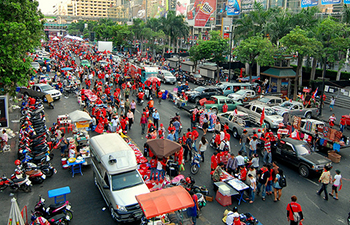At least 80 people were killed during the latest clashes in Thailand. But the confusion and danger that are present in various parts of Bangkok do not explain why several Thai and foreign journalists have been shot since April. Two are dead. The tense political situation also doesn’t justify the leadership’s blocking of more than 4,000 anti-monarchy websites.
As we at Reporters Without Borders recently stated in regards to the Thai government’s actions, “The right to information is more important than ever when a country is in crisis.” Yet several reporters have been gunned down and the Internet is falling prey to censorship. So far, around 4,500 websites have been blocked in an attempt by the regime to institute partial censorship of news about the nine-week crisis. Former Prime Minister Thaksin Shinawatra’s Twitter account has also been blocked since May 19.
On that same day, the leadership’s Centre for Resolution of the Emergency Situation (CRES) blocked Facebook and Twitter, which had been functioning as alternative sources of news after TV stations began broadcasting government-controlled programming. Also that day, the Bangkok headquarters of Channel 3 was set on fire by anti-government protesters, and the two biggest English-speaking dailies, the Bangkok Post and the Nation, sent their employees home at 3 p.m. due to fears that their offices could be attacked by Red Shirts. At this point, almost all local journalists avoid going into the streets to cover the situation because of concerns about the risks.
by Clothilde Le Coz, June 3, 2010
Gathering Info in a Tough Environment
Journalists have been gathering information via social networks, the telephone, and from people trapped in the Wat Pathum Wanaram temple. (It adjoins the square where the Red Shirt protestors had gathered.) Only a few foreign reporters are still on the ground. Here is a video interview with Italian photo-journalist Fabio Polenghi in which he explains the varying treatment of local and foreign reporters:
Sadly, Polenghi died on May 19 during the army’s assault on the Red Shirts in Bangkok.
As of today, two reporters have been killed and several injured since mid-March. In testimonies obtained by Reporters Without Borders, foreign journalists also reported feeling targeted. Arnaud Dubus, a reporter for the French daily Libération and for Radio France Internationale, told us, “This is the first time in Thailand that I feel that foreign journalists are really targeted.”
The Geneva Convention forbids journalists from being military targets. Thailand was elected to the United Nations Human Rights Council on May 15, and now it is violating humanitarian and international law principles.
Online Crackdown Goes On
Blocking Twitter and Facebook is nothing new for Thai authorities. Since at least 2009, this has been a regular practice among the Thai police. So far, one blogger, Suwicha Thakor, has been jailed for his online activities. In April of last year, he was given a 10-year jail sentence by a criminal court in the northeast Bangkok district of Ratchada. This was for posting content online that was deemed to have insulted the monarchy. Thakor has been held in Bangkok’s Klong Prem prison since January 14.
One challenge is that the Internet is not well regulated in Thailand. The country’s Computer Crimes Act, which was adopted in 2007, is too vague. That means the ongoing trial of Chiranuch Premchaiporn, the editor of the Prachatai news website, could create a legal precedent. She is facing up to 50 years in prison for failing to act with sufficient speed to remove “offensive” comments about the monarchy that were posted on the site.
Arrested on March 31, Chiranuch was released after three hours when her sister guaranteed the 300,000 bahts (6,000 euros) in bail demanded by the judicial authorities.
“In normal times I would be more confident about this initial hearing,” she told Reporters Without Borders. “I hope the court will make allowance.”
Under the Computer Crimes Act, owners and editors of websites can be prosecuted when they publish comments that are deemed to have broken the law. The owners are regarded as being as responsible as the commenters themselves.
Chiranuch’s website, as well as its Facebook page and Twitter account, has repeatedly been blocked by the Centre for Resolution of the Emergency Situation since the start of Thailand’s political crisis. The Prachatai news website was founded in 2004 — when the now deposed Thaksin Shinawatra was still prime minister — with the aim of being an alternative source of news. Its news section receives more than 20,000 visitors a day, while its forum receives about 30,000.
The harassment of netizens is widely spread and does not stop at Thai borders. In 2006, Anthony Chai, an American citizen from California, was interrogated by Thai officials in Thailand and again later in the U.S. for allegedly insulting the monarchy in 2006. Originally from Thailand, Chai was granted U.S. citizenship in the late 1970s. He faces possible arrest if he returns to Thailand. “What if now the U.S. is allowing a U.S. citizen to be interrogated by foreign agents on U.S. soil?” he said. You can read more about Chai’s case here.
(For more on Thailand and other countries’ “lese majeste” laws against insulting the monarchy, see this previous story on MediaShift.)
Clothilde Le Coz has been working for Reporters Without Borders in Paris since 2007. She is now the Washington director for this organization, helping to promote press freedom and free speech around the world. In Paris, she was in charge of the Internet Freedom desk and worked especially on China, Iran, Egypt and Thailand. During the time she spent in Paris, she was also updating the “Handbook for Bloggers and Cyberdissidents,” published in 2005. Her role is now to get the message out for readers and politicians to be aware of the constant threat journalists are submitted to in many countries.
